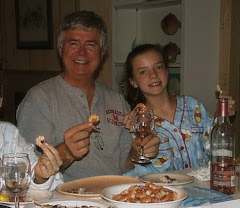Hannah Lincoln
Journalism 315
15 December 2009
Final Reflection
JOUR 315 was an afterthought.
Originally signed up for a different class—that, for many reasons, failed miserably—I didn’t know that writing nearly a dozen reviews and editorials would ever be on my plate of English classes, much less included with my already over-indulged semester.
Despite this original hesitation (and unawareness), Journalism 315 turned out to be the perfect mix of research, opinion and voice that I needed to counteract the long essays of my Lit major. Quite frankly, it was fun.
Stylistically, I came in with nothing in the name of writing journalistically. I knew that lists dropped the last comma and that the paragraphs were significantly shorter than the ones I was used to, but that was about it. I had to build this city from the ground up.
My first group, Ringo, was a godsend to my insecure, faux-journalist beginnings. Ashley, Sonia and Kayla read my reviews with kindness, pointing out more positives than negatives and giving helpful pointers from their own plethora of experience.
IMHO, my best review from Ringo would be the book review of The Lightning Thief by Rick Riordan. I loved reading the book (and am very much looking forward to reading #2, Sea Monster, first thing Wednesday night), and I believe that shows in my writing. The textual references were easy to pull out and the overall tone was extremely easy to convey—I loved the book and I think you will, too.
And making an impromptu list of the twelve Olympian gods and goddesses with my professor, Jeffrey, was pretty fun as well.
*Zeus, Poseidon, Athena, Apollo, Artemis, Demeter, Dionysus, Aries, Aphrodite, Hermes, Hestia….shoot!*
I also learned valuable journalistic lessons during the writing of my first institutional editorial.
After attending an upsetting church service in October, I wrote a piece about the boundaries between a pastor’s personal opinion and that of the church he serves, and what happens when the line is crossed.
I do admit—it was hard to keep my personal feelings and frustrations apart from the focus of the piece. Especially because the church I attended was one I (formerly) held a high opinion of, writing about its shortcomings was a hard pill to swallow and it showed in my editorial.
Another memorable review began with the theatre. Unlike most of my peers, I was fortunate enough to attend the traveling performance of Mama Mia! A long-time lover of ABBA and a patron of Mama Mia!, the experience at the theatre was extraordinary. The review, however, was difficult.
I found it hard to explain the plot of the play without giving away too much information. Consequently, I left out too much. This process of omission happened a lot during my journalistic journey, especially in the Transformers review. Transformers was my first review ever, and I definitely had to redo my final copy for lack of proper descriptions.
In fact, I reviewed every piece from my Ringo days. Even compared to other journalists in the class who passed every review with flying colors, though, I’m not ashamed. I was thankful for the opportunity to fix my mistakes and learn from experience.
While I certainly had lots of practice editing and redoing with Ringo, my work paid off during my days with my second group, Paul. Even though Paul had a different flavor than Ringo—the distinct taste of burnt-out college students heading face-first into finals, for one—there was one element that kept me going:
Blogging.
As it turns out, I’m a way better blogger than I am a journalist. The freedom of the blog style and the knowledge that basically no one was reading it made blogging different, fun and exciting.
I found that my voice drastically improved when writing for a blog. The feeling of writing for a potential newspaper or magazine felt different for me than the freedom of my own blog, and my writing noticeably improved with the latter.
Finding sentences that flow well even when there isn’t a lot of space was a challenge. Learning how to craft sentences that came together in 500 words (or less) was difficult at first, but I feel as if my leads and overall tone improved once I moved to a blog.
Of my blogging experience, I would say my favorite editorial was my final one—Obsession. I feel like it encompasses everything I learned throughout the semester in terms of tone, examples and the crafting of a good lead.
Throughout Journalism 315, my writing improved because of the examples of good writing around me. The fishbowl experience was certainly daunting, but the two times my group went were ultimately positive experiences.
It was, of course, terrifying to have my first fishbowl during my gay-marriage rant week—what a perfect piece to send out to the masses. The editorial was well received within my group, thankfully, and the class didn’t have any vocal commentary. *Pass*
Reading the pieces of others during their respective fishbowl weeks was often enlightening and refreshing. Some memorable editorials and reviews that inspired me include Sara’s piece on the Sioux Falls convention center (and lack thereof), Megan’s thrift store search and Sonia’s whoopee pie parody. Seeing the style, flow and blatant humor in these pieces in particular helped me to turn their examples into workable formats for my papers.
Despite many good papers presented in fishbowls, however, there were also some that I definitely did not like. Seeing some of the less than lovely writings week after week has also taught me what not to do when writing an article.
For example: I’m sick of your exclamation points (!), I don’t appreciate hearing about how much you hate Twilight and I really didn’t care for all of your bubbly enthusiasm and wordy embellishers.
These are just a few notes that I took when looking at other people’s writings and comparing them to my own. Not that I’m the expert here, but I do feel like fishbowling has helped me form an opinion about what is good writing and what is not.
Even though I’m an English Literature major and I have no intention of changing that (especially so close to graduation), I still value my experience in the world of journalism.
As a writer, this class was beneficial in developing my short-paper writing skills. If I one day do any freelance writing, I now have a background in reviews and editorials and the resources necessary to write them.
In my experience, sometimes the afterthoughts have the best outcomes. I may not have originally intended on joining JOUR 315, but I wouldn’t be where I am today without it.










